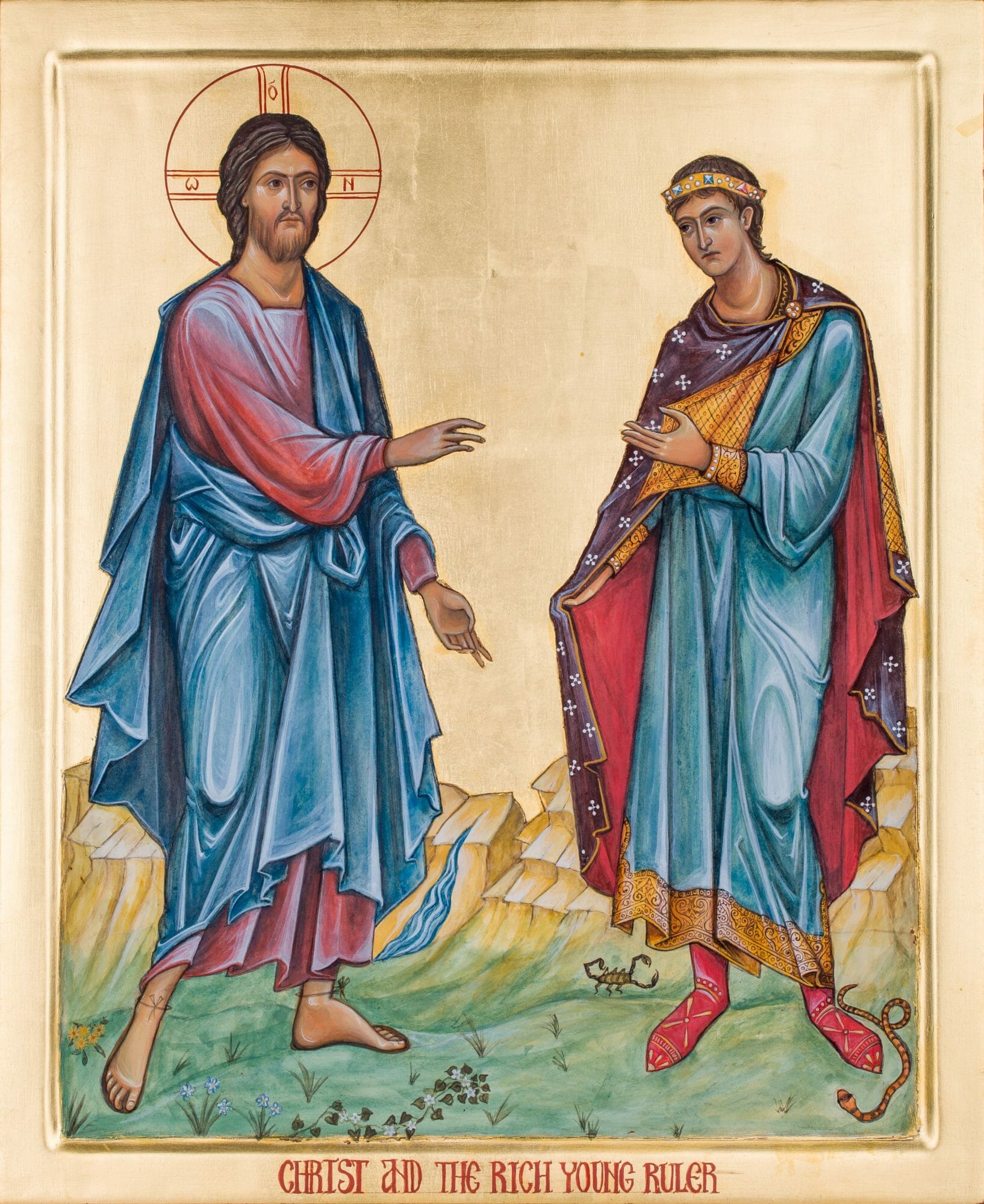Easter Day - 20 April 2025: Isaiah 65:17-end, Acts 10:34-43 and John 20:1-18
Not darkness but twilight
In which even the best
of minds must make its way
now. And slowly the questions
occur, vague but formidable
for all that…
The opening of R. S. Thomas’s poem “The Answer” draws us into where we find ourselves this morning.
We like the first witnesses to the resurrection out caught in the half-light. Easter begins in the early morning; in the not-yet light darkness of dawn.
Questions occur, vague but formidable. Has the stone moved, or is it a trick of the light? Are those shadows or grave clothes? Can I trust what my eyes see, the sense my mind makes? Is that the gardener?
Easter begins here: not darkness but twilight.
R. S. Thomas is unafraid to write about problems and how we answer them, kneeling, praying; waiting for the stone to roll from our minds.. He takes us to the point of dying, and to the piled graveclothes of ‘love’s risen body’.
He invites us to trust in the midst of struggle, as the disciples did. Whether they ran or hesitated, wept or rejoiced, they had to allow their imaginations to come to terms with something new.
As light breaks in at dawn, their minds and emotions respond to slivers of hope; of life. That looks different for each of them.
Peter hears the rumour and runs towards the tomb. He’s outran by his friend, the Beloved Disciple, the one who trusts and senses love’s risen body.
Mary arrives first and flees - the questions are too formidable. But she returns, hearing love speak and touch her heart.
Resurrection breaks-in not in darkness but twilight; it meets them where they are as a stone rolls from their minds, questions folded to oneside; love’s risen body taking up space not in an empty tomb but in and around them.
They all come to the tomb as they are - with all their fears and hopes, questions and emotions. They give us permission to approach the empty tomb as we are too - whatever our experience of loss or the hope we need to face tomorrow; whatever our struggles and disappointments; whatever baggage weighs us down or new life that sets us free.
Today we are invited to linger in the garden, alone and in the company of friends. We listen as our names are spoken in tenderness; as the seed of this story settles in our hearts. Here we begin to notice what love’s risen body might mean for us, in our lives.
Mary was the first to encounter the risen Jesus - and the first to speak of that experience. She waits, kneels, weeps and questions in this sacred time at the point of death, and the possibility of life beyond it.
She remains in twilight: feeling the fullness of her bewilderment and pain. She remains before the emptiness, giving herself over to agony of tears and heartbreak. She remains in the garden, searching for answers; bearing witness to what feels unbearable.
Her faithful love and openness, her honesty and questioning leads her to a moment of clarity. As the theologian David Ford puts it: "Mary had been looking for a dead ‘what’; she is questioned and surprised by a living ‘who’.”
As she hears her name, she recognises her teacher. She reaches out to that hope and healing; but rather than holding on to him, she is promised something more.
Her letting go also signals that Jesus, love’s risen body, can now relate to all people, places and times. Mary also receives a new purpose within a new network of friends - that of being a witness, of sharing her testimony.
She is the first to say: “I have seen the Lord”.
Peter and the Beloved Disciple had confronted the emptiness of the tomb, but neither of them waited. Their responses speak to our feelings and experiences too.
Peter rushes headlong into the tomb; but he cannot stay in that empty, desolate and painful place. He runs with his mind full not only of doubts and questions, but also the weight of his own failure and denials.
His emotional landscape has been reshaped by exhaustion, shame and fear. He cannot risk waiting. He abandons the garden for a room with locked doors.
But it’s there that the stone rolls from his mind. It’s there, perhaps, that he heard Mary’s cry of joy; it’s there'll he hears Jesus’s words of peace.
In his haste, his retreat and defences, the good news of resurrection finds him. He can run, but new life waits. Love’s risen body claims him as his own, forgives and restores him.
What of the Beloved Disciple? He too runs, but he hesitates. When he enters the tomb he sees beyond the emptiness and believes. He embraces what he sees - his heart and mind remain open for faith to be renewed in him; for trust to deepen.
Believing because of the empty tomb and folded graveclothes is for him the beginning of a new understanding. It is his imagination and experience that shapes the Gospel that bears his name, John.
He is the one who brings Jesus’ mother Mary into his own home; he is the one who invites successive generations into the space of the story he tells; deepened by images of light and life, of truth and a new commandment of love.
He invites us into this journey too. He gives us permission to believe and to trust - and yet to allow space for understanding to grow. He waits with us in death’s reality and its defeat. He invites us to trust that all will be made new, to persevere when justice and mercy seem fragile.
Resurrection is as much a process as an event; it’s a promise made at the graveside, just as twilight promises a new day.
It is the promise of what we long for: from Ukraine to Gaza, Sudan to Jerusalem, in every place where tears are shed. It is the promise of homes to inhabit and grapes to be harvested; it is the promise of life from infancy to old age, with dignity, joy and delight. It is the promise of blessing - and an end to hurt and destruction.
It is the promise of a new heaven and a new earth, as Isaiah puts it.
That can feel a long way off.
In Acts we hear Peter preaching in a world not so different from ours: where the power of empires, with power and wealth, seek to possess, control and dehumanise; where culture wars value some bodies and lives less than others; where rights are reduced to a zero sum game; where scarcity and excess divide peoples and communities; where the world itself cries out for release.
Peter begins with words that speak of divine acceptance; the dying and rising of Jesus presses us further into this way of life, an ethic of love.
As Willie Jennings puts it: ‘The Jesus of history becomes the defining moment of all history. Here is the deliverance of the world and its restoration toward health and life… The unbelievable has happened: Jesus was killed and rose from the dead. Death has been overcome in and through him. Yet this was no singular miracle but rather the great announcement of the new order - Jesus is the judge of the living and the dead. He is the Lord of all.’
This cosmic hope is also personal and particular: Peter preaches the forgiveness he has known. As he speaks, the Spirit moves, inviting us to love those who are different to us. In Christ, God brings loving judgement to us and a wayworld world - calling us to embody love where we find ourselves; to announce in the way we live what Jennings calls ‘God's desire for joining and communion’.
Such new life cannot be stopped, though many try to place a limit on the scope of love. We will rise. We glimpse it now through tears; through communion. We glimpse it as many bodies - beautiful, aging, bruised and tender - made one. Every grief and every hope, every doubt and every joy is held within love’s risen body as Thomas ends his poem, “The Answer”:
There have been times
when, after long on my knees
in a cold chancel, a stone has rolled
from my mind, and I have looked
in and seen the old questions lie
folded and in a place
by themselves, like the piled
graveclothes of love’s risen body.



